Treating Alzheimer's Disease Naturally with Alpha Lipoic Acid

Alzheimer's disease is a neurodegenerative brain condition. It progressively worsens, leading to dementia and eventually death. (iii.55, 56)
At this time, conventional Alzheimer's treatments only relieve symptoms. They can also come with some serious side effects. Researchers suggest that alpha lipoic acid could help safely treat and slow the progression of Alzheimer's disease. (iii.55)
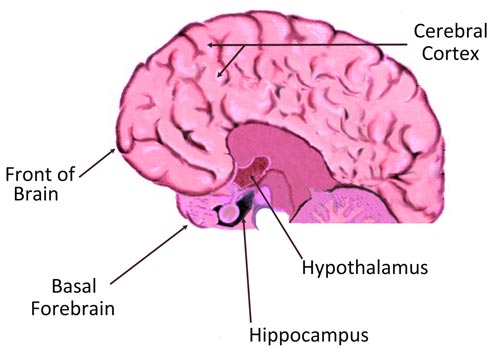
Figure III.2: The Brain
What Parts of the Brain Are Affected?
Alzheimer's damages areas of the brain that control memory, thinking, and learning — the basal forebrain and cerebral cortex region of the brain. These areas have a large concentration of neuron brain cells that produce acetylcholine (ACh). (iii.34, 55-57)
Acetylcholine is an essential neurotransmitter chemical for learning and memory. The toxic effects of Alzheimer's plaques are most severe on the ACh-producing neurons in these regions. Loss of acetylcholine is directly linked to the symptoms of dementia in Alzheimer's. (iii.34, 55-57)
Symptoms of Alzheimer's Disease
Although Alzheimer's is typically diagnosed in elderly patients, genetics play a role in those who develop it at an early age. Some of the more common symptoms include: (iii.55, 56, 58)
- Memory loss that worsens over time.
- Difficulty speaking and recalling words.
- Unable to think clearly and make decisions.
- Disorientation (even in familiar places).
- Everyday activities become overwhelming.
- Behavioral changes such as psychotic episodes, aggressiveness, and agitation.
What Causes Alzheimer's Disease?
When we are healthy, our bodies naturally maintain a balance between antioxidants and free radicals. Chronic conditions upset this balance and without treatment create unhealthy inflammation and damage to brain cells. Diseases and other factors that increase the risk of Alzheimer's include: (iii.55)
- Type 2 diabetes.
- Immune system dysfunction.
- Thyroid disorders.
- Traumatic brain injury.
- Toxic levels of heavy metals.
Research suggests that alpha lipoic acid could help reduce the risks associated with many of these disorders. (iii.2)
What Are Plaques in the Brain? How Do They Develop?
You may have heard that Alzheimer's disease causes lesions in the brain referred to as plaques. But are they exactly, and what causes them?
Poor Housekeeping - A Failure of PhagocytosisA healthy immune system has an efficient way to get rid of waste called phagocytosis. Macrophages, a type white blood cell, engulf pathogens and cellular debris and safely dispose of them. Phagocytosis prevents the buildup of protein fragments that form the protein clumps and tangled neurons that kill brain cells: (iii.55, 59, 60)
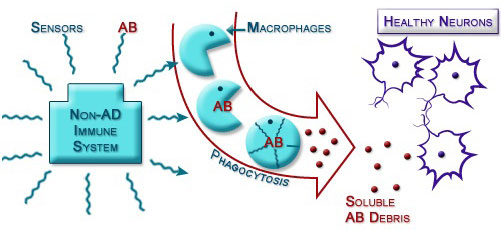
Figure III.3: Phagocytosis Clears out Aβ Proteins in Brain
But this waste disposal system barely works in Alzheimer's disease patients. Free radical damage and inflammation in the brain can produce potentially toxic buildup of proteins called amyloid-β and abnormal tau (AB): (iii.55, 59, 60)
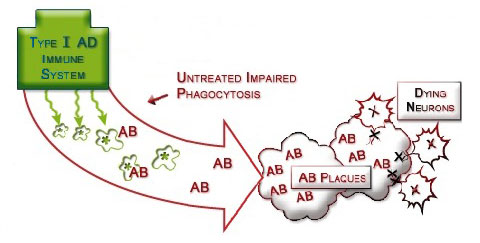
Figure III.4: Impaired Immune System in Alzheimer's disease
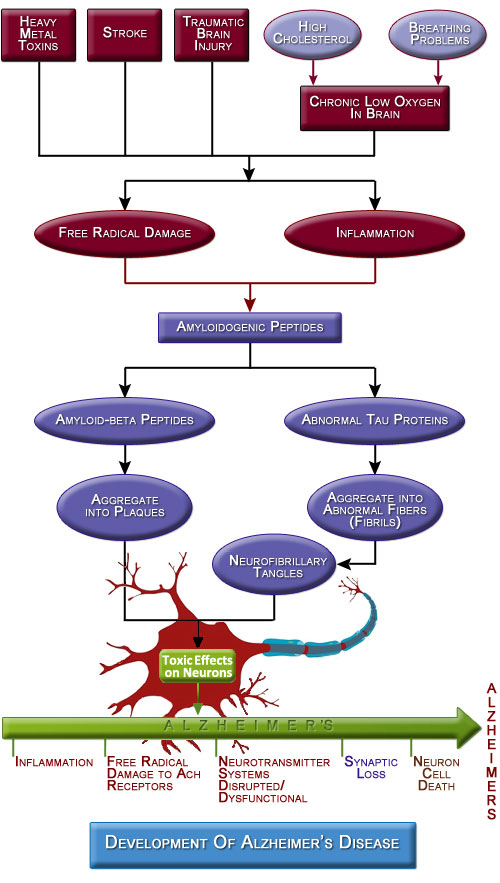
Figure III.5: Events Leading to Alzheimer's disease
As mentioned earlier, conditions that increase the risk of Alzheimer's disease create free radicals and inflammation, which promotes abnormal proteins. When the immune system fails to get rid of these proteins and protein fragments, they accumulate over time in the brain. Clumped together, they form the amyloid plaques and tangled fibrils found in Alzheimer's disease. Studies suggest they have deadly effects on neuron brain cells: (iii.55, 59)
How Can Alpha Lipoic Acid Help Prevent and Treat Alzheimer's Disease?
Lab and animal studies document that alpha lipoic acid has many beneficial effects in the brain. The results suggest that alpha lipoic acid can help overcome the harm of chronic inflammation that leads to Alzheimer's disease: (iii.52)
| Alpha Lipoic Acid Activity | Why is this Important? |
|---|---|
|
↑ Amount of glucose taken in by brain cells. (iii.33) |
↑ Acetylcholine, the brain chemical used for learning and memory. (iii.33) |
|
↑ Activation of enzyme necessary for production of neurotransmitters. (iii.33) |
↑ Acetylcholine. (iii.33) |
|
↑ Insulin sensitivity and improves glucose metabolism. (iii.61) |
↑ Neuron health and ability to recover from injury. (iii.61) |
|
↓ Excess iron and copper in the brain. (iii.34) |
↓ Aβ protein fragments (which form plaques) in some animal models. (iii.34) |
|
↑ Activation of Nrf2, a transcription factor that stimulates protective genes. (iii.34) |
↑ Detoxifying enzymes. (iii.34) ↑ Production of the natural antioxidants glutathione and coenzyme Q10 (CoQ10). (iii.16) ↓ Levels of free radicals. (iii.16) |
|
↓ Mercury levels. (iii.16) |
↓ Levels of free radicals. (iii.16) ↓ Plaques and tangled fibrils. (iii.16) |
|
↓ Mitochondrial dysfunction. (iii.16) |
↓ Levels of free radicals. (iii.16) ↓ Levels of excess glutamate. (iii.16) ↓ Excitotoxicity. (iii.16) |
|
↓Free radicals and inflammatory proteins. (iii.16, 34, 61) |
↑ Energy production by cell's mitochondria. (iii.16) ↓ Sensitivity of neurons to excitotoxicity. (iii.16) ↓ Excitotoxicity caused by glutamate. (iii.16) |
All of alpha lipoic acid's activities interfere with the degenerative cycle of inflammation that destroys brain cells which make acetylcholine: (iii.2, 34)
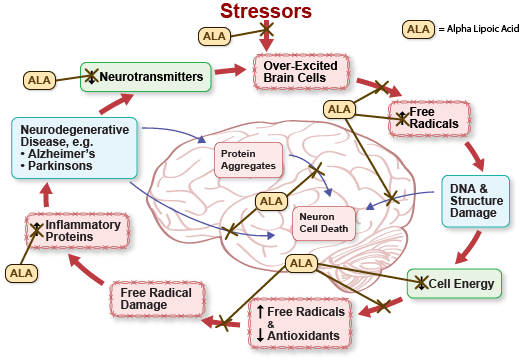
Figure III.6: Alpha Lipoic Acid Protects Brain Cells
Clinical Evidence of Alpha Lipoic Acid's Anti-Alzheimer's Activity
In preliminary, open clinical studies, alpha lipoic acid stopped the progression Alzheimer's disease. Before taking alpha lipoic acid supplements, patients with dementia had continuous decline in brain function based on cognitive testing. After they started taking 600 mg of alpha lipoic acid daily, their test scores stabilized and stayed that way for 4 years. (iii.62)
Antioxidants May Not Help in Older People with Down syndromeA randomized, placebo controlled study published in 2012 indicates that antioxidant supplements (alpha lipoic acid, vitamin E, and vitamin C) may not help treat people with Down syndrome and Alzheimer's disease. Almost 100% of people with Down syndrome have neurological signs of Alzheimer's disease by age 40, and they have fewer neurons to begin with. (iii.63)
However, the researchers acknowledge some limitations in the study that may have been a factor in the ineffectiveness of the antioxidants. Of note, the age of the study participants (average age was over 50) and almost ⅔ had moderate to severe dementia. (iii.63)


